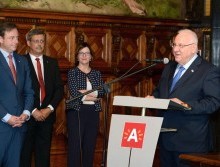
Israeli President Reuven Rivlin on his visit to Europe. Illustrative. Photo courtesy of Mark Neiman (GPO)
Israeli President Reuven Rivlin has his own plan for Middle East Peace—and it’s not the French initiative. And where better to present an alternative to a French plan? In Europe, of course. Rivlin, in excerpts of a speech released by his office, told the European Union Parliament on Wednesday that the French initiative suffers from “fundamental faults.” Said Rivlin, “The attempt to return to negotiations for negotiations’ sake, not only does not bring us near the long-awaited solution, but rather drags us further away from it.”
Instead, Rivlin called for a more paced approach on multiple fronts: economic, diplomatic, and educational, with the Hamas rule in Gaza a crucial obstacle to peace. “In the current circumstances, we must all ask ourselves ‘what can be done today’, rather than, ‘what cannot be done,’” said Rivlin.
23 years of off-and-on negotiations between Israel and the Palestinians have not yet reached peace, a point Rivlin highlighted. “As years go by and rounds of negotiations fail one by one, bringing in their wake, waves of murderous violence and terror, it seems that this assumption of a ‘lack of good will’ proves not only to be fundamentally erroneous, but to ignore the circumstances, the capabilities, and the present situation on the ground, which by definition would lead to the failure of any attempt to negotiate a permanent agreement.”
Turning to history, Rivlin argued that if the Europeans who opposed the Israel-Egyptian peace plan because it didn’t address the Palestinian situation had won, almost 40 years of peace might never have happened.
And now it is Egypt, along with fellow Israel-peace partner Jordan, who can work in the region towards Israel-Palestinian peace, according to Rivlin. Looking more broadly, the Israeli President also believes the international community can assist the Palestinian economy, including by finding a “solution” to the Hamas rule in Gaza and a means to enable trade in and out of Gaza that is still secure and prevents terrorism.
“On this issue, the State of Israel has repeatedly stated its willingness to join hands with the international community in a joint endeavor,” said Rivlin. “Israel considers the rehabilitation of Gaza, as the economic development and equalizing of life standards on both Palestinian and Israeli part, to be both an ethical and security interest.”
Joint initiatives across the Israeli-Palestinian relationship, in the energy industry, infrastructure and environmental issues—as well as education towards peace and mutual understanding—are also necessary steps for true peace, he said.
Rivlin told the European lawmakers that their continent can play a key role, but they can’t resort to blaming and pressuring Israel. A long-view approach aiming to building trust between Israel and the Palestinians is the way to go, argued Rivlin.
“If Europe is interested in serving as a constructive factor in striving for a future agreement, it will be incumbent upon you its leaders, to focus efforts at this time in a patient and methodic building of trust,” said Rivlin. “Not through divestments, but through investment; not by boycotts, but by cooperation.”
(By Joshua Spurlock, www.themideastupdate.com, June 22, 2016)
